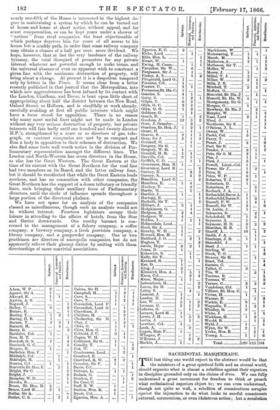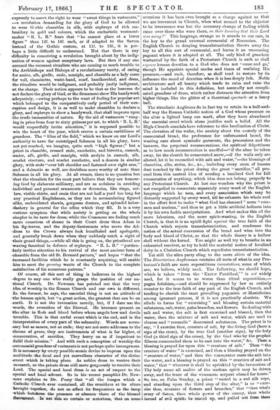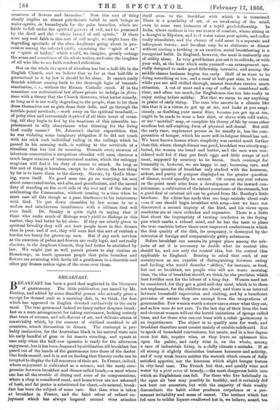SACERDOTAL MASQUERADE.
T. last thing one would expect in the abstract would be that the ministers of a great spiritual faith and an eternal world, should organize what is almost a rebellion against their superiors in discipline grounded only on the claims of dress. We can fully understand a great movement for freedom to think or preach what ecclesiastical superiors object to ; we can even understand, though not quite so well, a rebellion of conscientious scruples against the injunction to do what looks to careful.consciences external, ceremonious, or even idolatrous action ; but a revolution expressly to assert the right to wear "sweet things in vestments," —a revolution demanding for the glory of God to be allowed to wear Gothic chasubles in silk, with orphreys of rich em- broidery in gold and colours, which the eucharistic vestment- maker " R. L. B." fears that "he cannot place at a lower -figure " than 121. to 18/. each, or if adapted to the Sarum instead of the Gothic custom, at 11/. to 161., it is per- haps a little difficult to understand. Not that there is any difficulty in conceiving a revolution brought about by the indig- nation of women against sumptuary laws. But then if any- one' accused the recusant ritualists who are causing so much trouble to the Archbishops and Bishops of a revolutionary vanity, of oaring for amice, alb, girdle, stole, maniple, and chasuble as a lady cares for veil, chemisette, waist-band, scarf, handkerchief, and dress, the ritualists would be indignant, and probably justly indignant, at the charge. Their notion appears to be that as the heavens do not declare' the glory of God, or the firmament show His handywork' adequately, —owing perhaps to the want of feeling for popularart which belonged to the comparatively early period -of their con- ception and design, it is as well to make chainibles to declare a glory, and orphreys to show a handywork, that shall improve upon the crude immensities of nature. By the aid of vestments "rang- ing in pricenfrom four to sixty guineas per set, to which R. L. B.' would respectfully invite attention," it is supposed possible to win the heart of the poor, which craves a certain earthliness of grandeur. The " lilies of -the field," which we know on our Lord's authority to have far outstripped Solomon in all his glory, have not yet reached, we imagine, quite such " high figures ;" but a priest in chasuble, crossed stole, zucchetto, and birretta, cassock,- amice, alb, girdle, and maniple, with acolyte in cassock, alb, scarlet cincture, and scarlet zuedhetto, and a deacon in similar glory, with stole "over left shoulder and fastened over right arm," and a claimed° as well, are doubtless more worthy of note than Solomon in all his glory. At all events, there is no question but 'that the ritualists for the most part believe that they are honour- ing God by elaborate millinery, and are as sedulous in avoiding individual and personal ornaments or decencies, like rings, col- lars, visible shirts, and teats that are not half a -yard too long for any practical Englishman, as they are in accumulating figured silks, embroidered shawls, gorgeous dusters, and splendid haber- dashery in general for the office which they fill. It is a very curious -symptom that while society is getting on the whole simpler in its taste for dreae, while the- Commons are feeling much more conscious of shame in their Court dress than Adam in his fig-leaves, and the deputy-lieutenants who move the Ad- dress to the Crown always look humiliated and apologetic, and generally break down when they suddenly catch a sight of their grand things,—while all this is going on, the priesthood are waxing fanatical in defence of orphreys. "R. L. B." "particu- larly invites attentionto his revival of the most ancient form of -chasuble from the old St. Bernard pattern," and hopes " that the increased facilities which he is constantly acquiring, will enable him to meet the growing wants of the Church to the complete -satisfaction of his numerous patrons."
Of course, all this sort of thing is ludicrous in the highest -degree to any one who really grasps the position of our na- tional Church. Dr. Newman has pointed out that the very idea of worship in the Roman Church and our own is different. In the former, he says, the essential thing is not an attitude of the human spirit, but " a great action, the greatest that can be on -earth. It is not the invocation merely, but, if I dare use the -words, the evooation of the Eternal. He becomes present on the altar in flesh and blood before whom angels bow and devils tremble. This is that awful event which is the end, and is the interpretation of every part of the solemnity. Words are neces- sary bat as means, not as ends ; they are not mere addresses to the throne of grace, they are instruments of what is far higher, of consecration, of sacrifice. They hurry on as if impatient to fulfil their mission." And with such a conception of worship the ceremonial grandeur of vestments is not perhaps quite incongruous. It is necessary by every possible -scenic device to impress upon the _multitude the local and yet marvellous character of the divine event which is taking place. As nobles dress to receive their monarch, so the priests dress still more gorgeously to receive their Lord. The special and local dress is an act of respect to the special and local advent. So in his recent pamphlet Dr. New- man explains to Dr. Pusey that " all the images which a Catholic Church ever contained, all the crucifixes at its altars brought together, do not so affect its frequenters as the lamp which betokens the presence or absence there of the blessed Saerainent. Is not this so certain or notorious, that on some occasions it has been even brought as a charge against us that we are irreverent in Church, when what seemed to the objector to be irreverence was but the necessary change of feeling which came over those who were there, on their knowing that their Lord was away?" This language, strange as it sounds to our ears, is the key to the grand external ceremonial of Romanism. The English Church in denying transubstantiation thrown away the key to all this sort of ceremonial, and leaves it an unmeaning pageant where it is adopted at all. The only kind of grandeur warranted' by the faith of a' Protestant Church is such as shall express human devotion to a God who does not ' come and go,' though He appoints special modes and times of realizing His presence,—and such, therefore, as shall tend to restore by -its influence the mood of devotion when it is less deeply felt. Noble architecture and all beauty which tends to calm and raise the mind is included in this definition, but assuredly not compli- cated grandeur of dress, which rather distracts the attention from higher-things, like the glitter of a theatrical spectacle or a fancy -ball.
The ritualistic Anglicans do in fact try to retain •in a half-and- half way the Roman Catholic notion of a God whose presence on -the altar a lighted lamp can mark, after they have abandoned the essential creed which alone justifies such a belief. AU the High-Church scandals have reference to this localization of Christ. The elevation of the wafer, the anxiety about the custody of 'the consecrated bread, the preference for unfermented bread, the wasting care about symbolic garments, the processions and the banners, the perpetual reconsecrations, the spiritual fidgettiness as to how much reconsecration is needful—" if the altar be taken away, let the-church be consecrated anew,—if the walls only are altered, let it be reconciled with salt and water,"—the blessings of chasubles, albs, stoles, &c., etc., including every atom of human dust touched by the priest during the great " sacrifice," all pro- ceed from this central idea of needing a localized God for full consecration of anything, which idea does not belong properly to any Protestant Church. At last one wonders why the priest is not compelled to consecrate separately every rword of the English language which he uses, and every association which may be distantly suggested by every word, till he exhausts his whole soul in the effort first to make " what God has cleansed " seem " com- mon and unclean," and then to get a little artificial holiness into it by his own feeble manipulations. And what makes this all the more laborious, and the more spirit-wasting, in the English Church, is that it is an uphill fight against the true faith of the ,Church which rejects transubstantiation, and condemns the notion of the actual conversion of fie bread and wine into the body and blood of Christ, so that the whole theory is a hollow shell without the kernel. You might as well try to breathe in an exhausted receiver, as try to hold the material notion of localized deity in a Christian Church which repudiates transubstantiation.
Yet still the ultra party cling to the mere skirts of the idea. The Directorium Anglicanism contains all sorts of what in any Pro- testant's faith are mere superstitious incantations, some of which are, we believe, widely used.. The following, we should hope, which is taken "from the Exeter Pontifical,' " is not widely used, for it seems to us worse than ritual superstition,— pagan fetishism,—and should be suppressed by law as entirely counter to the true faith of any part of the English-Church, and tending to cherish the most grovelling paganism or Manicheism among ignorant persons, if 'it is not practically obsolete. We allude to forms for " exorcising " and blessing certain material substances, salt, water, palm branches, and flowers. In dealing with salt and water, the salt is first exorcised and blessed, then the water, then the mixture of salt and water, which are used to cleanse and "reconcile" desecrated substances. The priest is to say, " I exorcise thee, creature of salt, by the living God (here a sign of the cross), by the true God (another sign), by the holy God (a third sign of the cross), by the God whop by the prophet Eliseus commanded them to be cast into the water," &c. Then a blessing is prayed for upon this " creature of salt." Then "the creature of water" is exorcised, and then a blessing prayed on the "creature of water," and then the consecrator oasts, the salt into the water, and a blessing is prayed on this " creature of salt and water," that " wherever it shall be sprinkled by the invocation of Thy holy name all malice of the unclean spirit may be driven away, and the trace of the venomous serpent chased far hence."
So, too, on Palm Sunday, a priest "vested in a red silk cope, and standing upon the third step of -the altar," is to "exor-
cise thee, creature of flowers and branches," that "thou whole army of Satan, thou whole power of the enemy, thou whole inroad of evil spirit; be rooted up, and pulled out from the creatures of flowers and branches." Now this sort of thing clearly implies an almost polytheistic belief in such beings as water-spirits, or hamadryads for the palm branches, which are liable to fall under the spiritual powers of evil, and be possessed by the devil and the " whole inroa. 1 of evil spirits." If there were any real faith in this sort of evil magic, wa might have the degrading spectacle of the ultra-Anglicans going about in pro- cession among the infected cattle, exorcising the " spirit of ox" or " spirit of heifer," which would, we imagine, grossly outrage the sense and conscience of the whole nation, and raise the laughter of all who like to see faith rendered ridiculous.
But on the whole the spirit of ritualism has but a half-life in the English Church, and we believe that so far as that half-life is guaranteed to it by law it should be let alone. It cannot really flourish without coming back to the thorough logic of transub- stantiation, i. e., without the Roman Catholic creed. If in the meantime our ecclesiastical law allows priests to indulge in flirta- tions with a theory that the Church disavows, what better remedy, so long as it is not really degrading to the people, than to let them dress themselves out as girls dress their dolls, and go through the terrible penal servitude, —work away on the spiritual treadmill,— of petty rites and ceremonials deprived of all their heart of mean- ing, till they begin to feel by the weariness of this miserable im- prisonment in silly observances what thirsting for the living God really means? Dr. Johnson's slavish superstition that he was violating some imaginary obligation if he did not touch with his stick each individual railing in the railings which he passed in his morning walk, is nothing to the servitude of a ritualism that has lost its meaning. Beneath every stratum of- laborious consecration a scrupulous ritualist will soon discover a much larger stratum of unconsecrated matter, which the unhappy magician will feel it his duty of course to attack. So long as this sort of thing is harmless, except to its slaves, the best thing by far is to leave them to the slavery. Slavery, by God's bless- ing, cures itself. No good man can go on worrying his soul about consecrated stoles, and albs, and genuflexions, and the sacred duty of standing on the north side of the west end of the altar in celebrating the Communion, without coming to a time when he must cast all this slough as a pure hindrance to his intercourse with God. To put down chasubles by law seems to us a useless and mischievous interference with a silliness that will cure itself. Dr. Stanley is quite right in saying that if those who make much of Bishops won't yield to Bishops in this matter, they had better be let alone. If they are utterly given to spiritual frivolity they will not hurt people more in fine dresses than in poor, and if not, they will soon find this sort of rubbish a burden too heavy for grown-up men. But if any such services as the exorcism of palms and flowers are really legal, and not really obsolete, in the Anglican Church, they had better be abolished by law. We might just as well permit priests to slay victims on Stonehenge, as teach• ignorant people that palm branches and flowers are swarming with devils till a gentleman in a chasuble and other gay dresses makes signs of the cross over them.
































 Previous page
Previous page